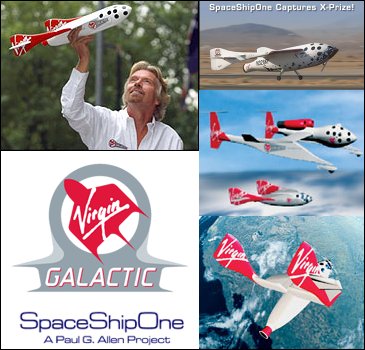January 02, 2005
Virgin Galactic: Bransonís Final Frontier

-
The dream of opening space to the general public was given a tremendous boost in 2004 with SpaceShipOneís prize-winning suborbital jaunt and congressional legislation to help establish a space travel industry in the United States. But even the biggest champions of commercial spaceflight acknowledge that a vital space tourism market is still years from becoming reality.
On June 21, Mike Melvill made aviation history as the first person to pilot a privately financed vehicle into space. Sitting at the controls of SpaceShipOne, the 62-year-old civilian test pilot jockeyed the air-launched vehicle to an altitude of 100 kilometers, climbing above the Earthís atmosphere for a few moments before gliding to a runway landing in the Mojave desert.
The record-setting flight put Burt Rutan and Paul Allenís SpaceShipOne in the lead to win the Ansari X Prize, a $10 million purse offered to the first team to launch a spacecraft to 100 kilometers with a pilot and the weight equivalent of two passengers on board, return safely to Earth and repeat the feat in the same vehicle within two weeks.
Three months later, Melvill flew again, this time carrying the required passenger ballast to 102.9 kilometers. Five days after that, on Oct. 4, pilot Brian Binnie took the controls of SpaceShipOne and flew the craft to 112 kilometers. More than eight years after the St. Louis-based X Prize Foundation first announced the $10 million purse, a winner finally emerged from the field of 27 contenders. And not a moment too soon. To fund the purse, X Prize founder Peter Diamandis took out an insurance policy that was set to expire on Jan. 1, 2005. Had no one won the prize, the $10 million purse would have disappeared and the insurer would have pocketed the premium paid for the policy.
Now that the details are worked out, January's Wired magazine had the best run-down of how the cash-flow will develop:
-
The upshot is Virgin Galactic, the world's first off-the-planet private airline. Under a deal still being negotiated with SpaceShipOne's owners - Microsoft cofounder Paul Allen and legendary Mojave airplane designer Burt Rutan - Virgin will pay up to $21.5 million for an exclusive license to SpaceShipOne's core design and technologies. Another $50 million will go to Rutan's company Scaled Composites to build five tricked-out passenger spaceships. An equal amount will be invested in operations, including a posh Virgin Earth Base somewhere in the California desert. Total outlay: $121.5 million. Business plan: 50 passengers a month, paying $200,000 each. Core product: a two-hour flight to an apex beyond Earth's atmosphere, wrapped in a three-day astronaut experience. Lift off: T-minus three years.
Of course, Virgin Galactic is a tiny bit riskier than the typical Branson venture. For starters, the first passenger-carrying Virgin spaceship - already dubbed VSS Enterprise - is still just a glow on Rutan's computer screen. No one knows how big the market for seats into space might be. And what happens to the business model when a ship full of amateur astronauts fails to make it back to Mojave in one piece?
But look at the upside. The total price tag is half the cost of a single Airbus A340-600 - and Virgin Atlantic ordered 26 of those last summer. In return, Branson gets bragging rights to one of the cooler breakthroughs of the early 21st century, with rocket-powered marketing opportunities that could fuel excitement - and sales - in his entire 200-company holding group.
For the happy-go-lucky tycoon, though, there's something else at stake: Virgin Galactic is his chance to climb off that 747's wing and into the history books with the first airline - make that the first brand - on the final frontier. "Affordable private space travel opens a new era in human history," he tells reporters at a mini press event for the reality show in LA. "We'll go into orbit; we'll go to the moon. This is a business that has no limits."
Virgin Galactic isn't just about seizing first-mover advantage in space - it's about opening space to a wave of other entrepreneurs who will follow if Branson succeeds. Commercial spaceships will lead the way for private investment in what has been a government-funded vacuum, bringing a new physics of market forces to outer space. If Branson and his Virginauts can attract even a quarter of the customers they believe are out there, they'll rally today's alt.space backwater of wild dreamers, cranky engineers, and rich geeks to launch an era of glittery, out-of-this-world-class new businesses. "If we can make space fun," Branson says, "the rest will follow."
While I donít have $200K to drop on a few minutes of weightlessness, Iím sure, like all things cutting edge, that price will come down a bit. Whether in the future, or even during my lifetime, space tourism will become commonplace remains to be seen. In the meantime, Branson is getting as much great PR out of the deal as anything for his current businesses in the present. If the stewardesses are anything like the oneís on Bransonís airliners, he probably wonít have much trouble eventually filling the seats.
- Arik
Posted by Arik Johnson at January 2, 2005 01:37 PM | TrackBack "Competitive Intelligence applies the lessons of competition and principles of intelligence to the need for every business to gain awareness and predictability of market risk and opportunity. By doing so, CI has the power to transform an enterprise from also-ran into a real winner, with agility enough to create and maintain sustainable competitive advantage."
"Competitive Intelligence applies the lessons of competition and principles of intelligence to the need for every business to gain awareness and predictability of market risk and opportunity. By doing so, CI has the power to transform an enterprise from also-ran into a real winner, with agility enough to create and maintain sustainable competitive advantage."
